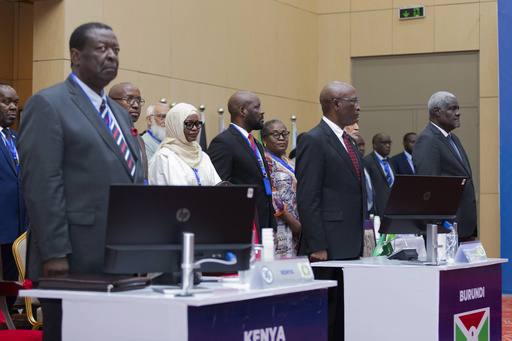KAMPALA, Uganda — On Saturday, leaders from eastern and southern Africa convened to demand an urgent ceasefire in eastern Congo, where rebel forces are posing a significant threat to the Congolese government. They also urged President Felix Tshisekedi to engage directly in negotiations with these rebel factions.
President Tshisekedi, who joined the summit via videoconference from Dar es Salaam, Tanzania, has previously maintained a hardline stance against the M23 rebels, whom he accuses of exploiting Congo’s rich mineral resources and being backed by Rwanda.
The final statement from the discussions advocated for renewed “direct negotiations and dialogue with all state and non-state parties,” specifically including the M23 militia. This rebel group had recently taken control of Goma, eastern Congo’s largest city, in a conflict that has resulted in nearly 3,000 fatalities and displaced several hundred thousand others, as reported by the United Nations.
This meeting marked an unprecedented collaboration between the East African Community (EAC), which includes both Rwanda and Congo, and the Southern African Development Community (SADC), consisting of various countries from Congo down to South Africa.
Rwandan President Paul Kagame and South African President Cyril Ramaphosa attended the summit, despite tensions stemming from the deployment of South African troops in eastern Congo to combat the M23 on behalf of SADC. Rwanda has criticized this intervention, arguing that it has exacerbated the conflict in North Kivu province, which is now largely under M23’s control. Kagame claimed that these troops should not be classified as peacekeepers since they were actively engaged in combat alongside Congolese forces against the rebels.
According to United Nations experts, M23 is bolstered by approximately 4,000 Rwandan soldiers, while Congolese government forces rely on a mixture of regional peacekeepers, UN support, allied militias, and military aid from neighboring Burundi. Their current objective is to prevent M23 from advancing towards Bukavu, the capital of South Kivu province.
The conflict has roots in long-standing grievances, with concerns from Rwanda regarding fighters opposed to Kagame’s government operating in eastern Congo, often in regions where governance is weak. Kagame has accused President Tshisekedi of ignoring the legitimate grievances of Congolese Tutsis who experience discrimination.
Kenyan President William Ruto emphasized at the summit that millions depend on leaders handling the tense situation with wisdom and clarity. He remarked, “Dialogue is not a sign of weakness,” urging all parties to set aside differences for constructive discussions. Ruto is currently leading the East African Community.
The resurgence of M23 echoes their earlier takeover of Goma over ten years ago and has effectively ended a ceasefire that was established in 2024 through negotiations led by Angola. Analysts speculate that this new offensive may carry greater momentum as the rebels are intertwining their cause with broader demands for better governance and have expressed intentions to march towards the capital, Kinshasa, located over 1,600 kilometers (1,000 miles) west of Goma.
In an open letter to the summit, the Congo River Alliance, a coalition comprising various rebel factions including M23, criticized the Tshisekedi government for breaching republican norms and becoming a serious threat to its citizens. The letter mentioned that the opposers of President Tshisekedi represent all provincial citizens, and asserted a collective national struggle that embraces all ethnic and community backgrounds, including Kinyarwanda-speaking Congolese citizens.
As the conference concluded, pressure mounted on the rebels to withdraw from Goma. Alongside calls for the airport in Goma to reopen, the leaders in Dar es Salaam also discussed the need to establish frameworks for the withdrawal of foreign armed groups from Congolese territory.
A recent meeting held in Equatorial Guinea by another regional coalition, the Economic Community of Central African States, also requested the urgent withdrawal of Rwandan forces from Congo and the reopening of the airport to enhance humanitarian aid access.



